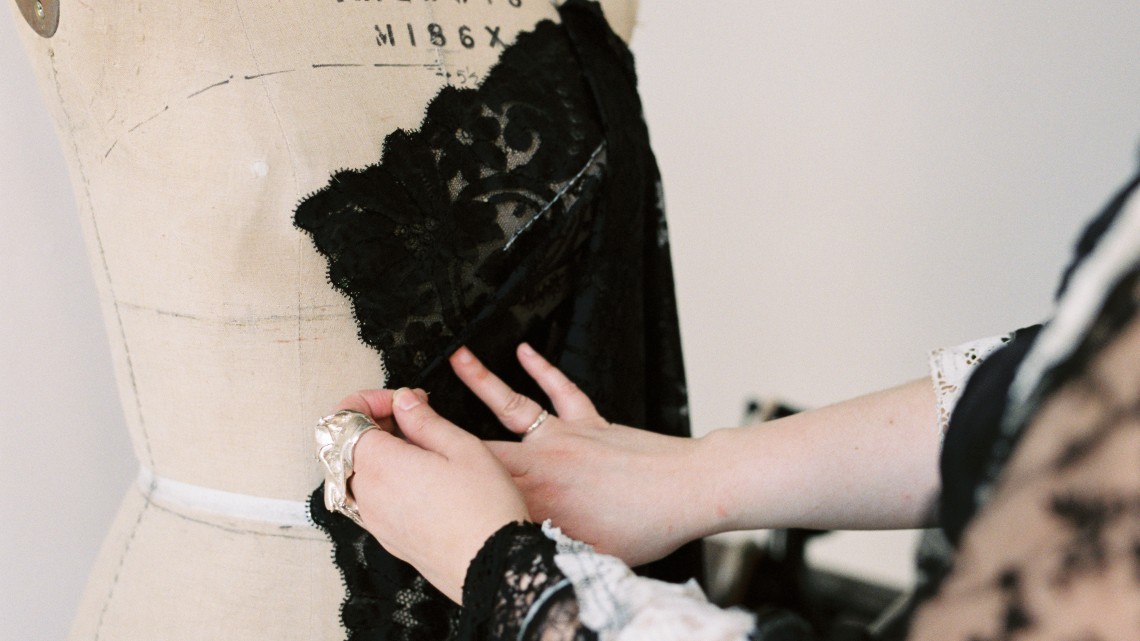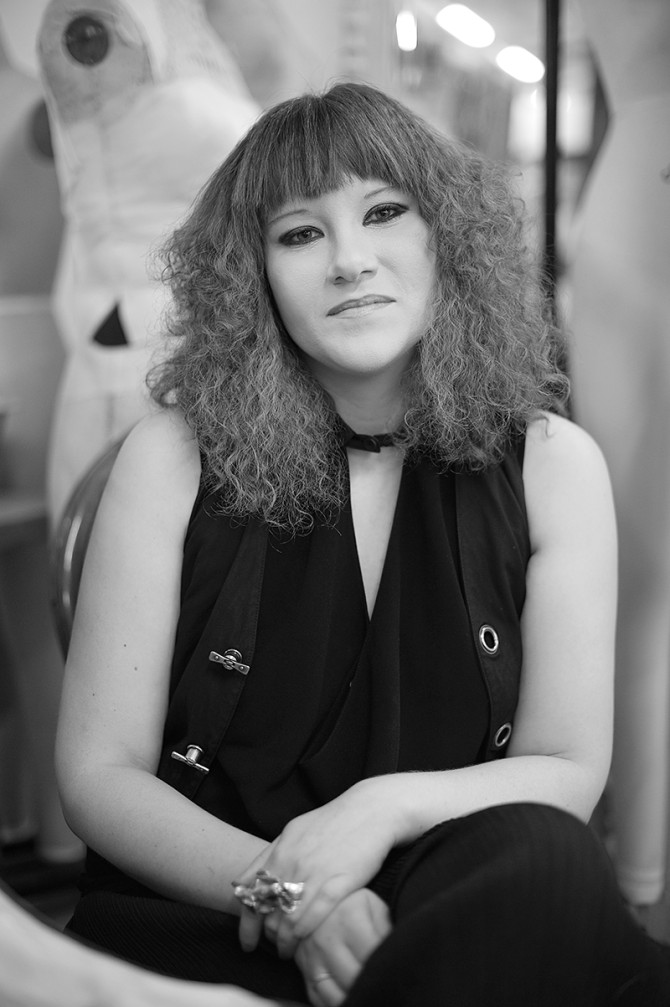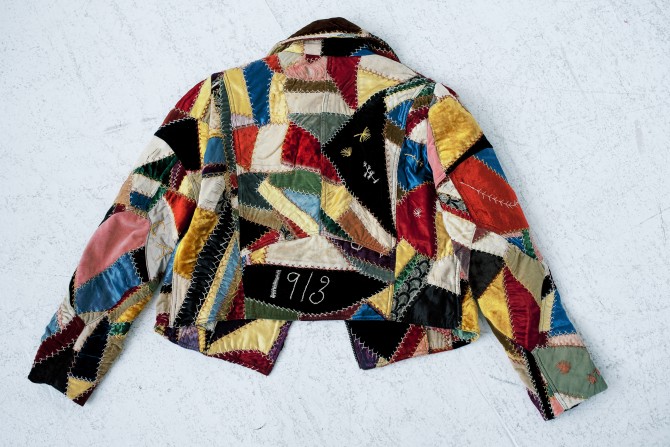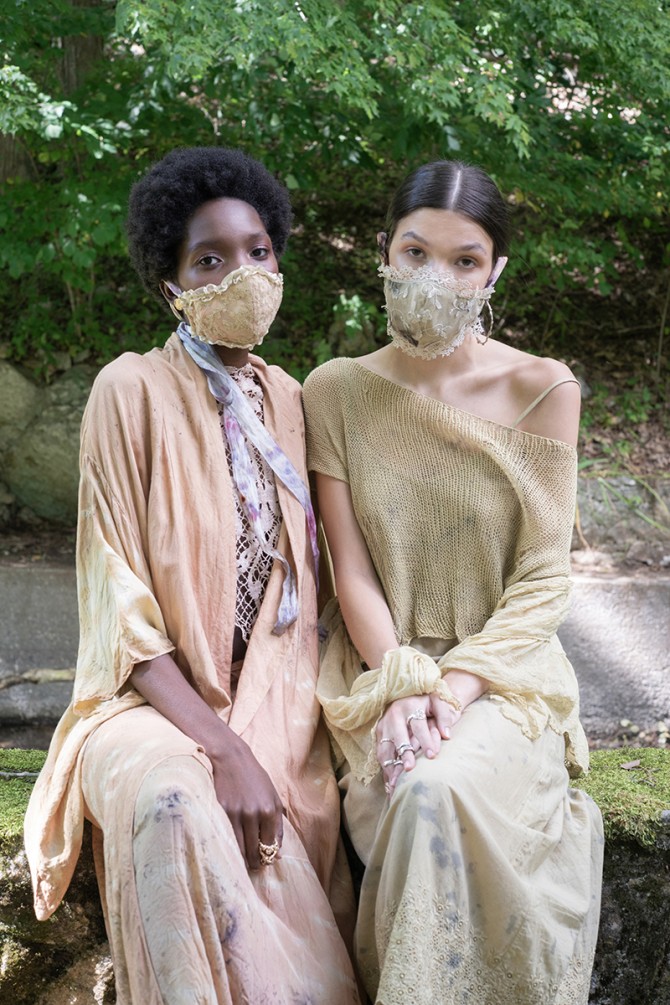
Designer Mimi Prober hand drapes lace fragments. She will create a new garment using antique textiles while in residency at the College of Human Ecology.
News directly from Cornell's colleges and centers
Designer Shares Her Love of Sustainable Luxury
By Robin Roger
Mimi Prober has a deep appreciation for history and handcraft.
A pioneer of the sustainable luxury mindset, Prober has been experimenting with antique textiles and natural dye techniques since she was a student studying fashion design at the Fashion Institute of Technology (FIT). Back then, finding new uses for old fabrics wasn’t as common, or even a consideration, she says. “Upcycling” may be on trend now, but the term wasn’t even used in common vernacular until a few years ago. Prober recalls the trash bins in work rooms filled with leftover fabric fragments (though Prober notes that FIT now has a robust sustainability program, and, as a graduate, she has participated in sustainability grants with FIT faculty in the textile department to study and bring to life the process of “farm to fashion”).
While she is at Cornell University as the designer-in-residence at the Jill Stuart Gallery from Oct. 13 to Nov. 9, she will meet with students, critique their work and exhibit her own. She will also create a new garment made from pieces that were slated to be retired from the Cornell Fashion + Textile Collection, maintained by the Department of Fiber Science & Apparel Design, within the College of Human Ecology.
“It will come full circle, using pieces that don’t necessarily have a space in the collection, but we'll reimagine it into something special,” Prober says.
Prober has long had a passion for finding and preserving fragments that were discarded at some point because they no longer had a use. She sources heirloom antique fabrics from the 18th to early 20th centuries at auctions and markets, and sometimes individuals reach out to her when they’ve inherited something that holds meaning for them, but they don’t know what to do with it.
Her philosophy is based on a desire to create mindful pieces and bring to life the stories embedded in them, sharing them with the next generation. There’s so much work that goes into making a garment, she says, and consumers don’t always realize that it’s not automated.
“We live in a society where it’s so easy to forget about where we came from,” Prober says. “So much is mass produced these days, and it’s a whole different mindset. I appreciate the detail from the past.”
Those details can be seen in the delicate handmade lace, embroidery, and patchwork quilting of the pieces in her atelier, as well as in her ready-to-wear collections, which include custom textiles made from materials sourced from family owned, local, and sustainable small farms and mills.
Her company has invested in community engagement, and she has partnered with a female-founded, all-women-run natural dye house in Lancaster, Pennsylvania, and a women’s lace guild in Kollam, India. A certified sustainable and organic factory in India that makes materials for her ready-to-wear line also provides full funding to all the female employees and their children to attend school.
“There’s a focus on sustainability for both the environment and the people,” she says.
Each season, Prober takes inspiration from handcrafted textiles, and finds a new textile or new technique to introduce. For instance, she has experimented with crazy quilts and signature quilts (also known as friendship quilts), giving new life to quilts that were hand-pieced and embroidered in the late 1800s to early 1900s.
Quilting was the original zero-waste technique, she says, because crafters would take the scraps they couldn’t use and make them into beautiful hand-embroidered textiles that were passed down through generations. Some even featured the signatures of the farmers or their wives who made them, and they took years to finish. Their stories were woven into them.
Prober’s own family history is reflected in her Spring 2022 Ready-to-Wear collection, which includes a nod to the 50th anniversary of the Return of Spring, a concert featuring the Grateful Dead, organized by her father and his music production company in Wisconsin.
Tasha Lewis, associate professor in CHE’s Department of Fiber Science & Apparel Design, suggested Prober serve as designer-in-residence after she interviewed her for a book chapter Lewis was writing on sustainable fashion.
"During the interview she described her design processes and techniques and showed me pieces from her collection,” Lewis says. “Her work is so amazing and creative.”
Prober has this advice for up-and-coming designers: “Stay true to yourself and your philosophy. Research as much as you can, and find something that speaks to you. Try to create things that are unique, because it takes so much time and energy to design and to make things. I'm of the mindset that you want to invest that energy in something special that's meaningful and will last, so stay true to your vision.”
Media Contact
Get Cornell news delivered right to your inbox.
Subscribe



